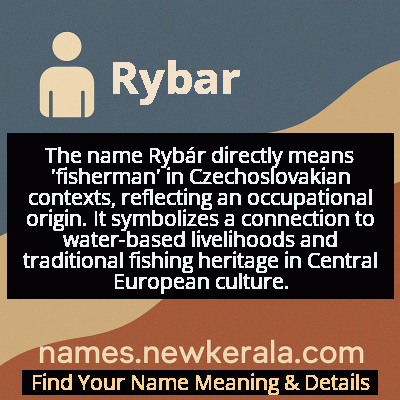Rybar Name Meaning & Details
Origin, Popularity, Numerology Analysis & Name Meaning of Rybar
Discover the origin, meaning, and cultural significance of the name RYBAR. Delve into its historical roots and explore the lasting impact it has had on communities and traditions.
Name
Rybar
Gender
Male
Origin
Czechoslovakian
Lucky Number
1
Meaning of the Name - Rybar
The name Rybár directly means 'fisherman' in Czechoslovakian contexts, reflecting an occupational origin. It symbolizes a connection to water-based livelihoods and traditional fishing heritage in Central European culture.
Rybar - Complete Numerology Analysis
Your Numerology Number
Based on Pythagorean Numerology System
Ruling Planet
Sun
Positive Nature
Leaders, ambitious, highly driven, self-reliant, innovative.
Negative Traits
Overly aggressive, domineering, impatient, selfish.
Lucky Colours
Red, orange, gold.
Lucky Days
Sunday.
Lucky Stones
Ruby, garnet.
Harmony Numbers
2, 3, 9.
Best Suited Professions
Entrepreneurs, managers, engineers.
What People Like About You
Courage, determination, leadership.
Famous People Named Rybar
Ján Rybár
Historian and Writer
Renowned Slovak historian specializing in medieval history and author of several influential historical works
Peter Rybár
Sports Coach
Notable Slovak ice hockey coach who developed young talent in regional leagues
Miroslav Rybár
Academic Researcher
Czechoslovak environmental scientist known for water resource management studies
Name Variations & International Equivalents
Click on blue names to explore their detailed meanings. Gray names with will be available soon.
Cultural & Historical Significance
In Slovak and Czech folklore, fishermen often appear as wise, patient figures with deep connections to nature and water spirits. The name carries echoes of this cultural heritage, representing not just an occupation but a connection to the natural world and traditional ways of life. During the medieval period, fishing rights and fishing-related surnames were often recorded in town charters, making names like Rybár important historical markers of family professions and social status in riverine communities.
The name also reflects the Slavic tradition of occupational surnames that became hereditary during the 18th and 19th centuries. As fishing communities established themselves along Central European waterways, the Rybár name became a proud identifier of families whose livelihoods were intimately tied to rivers and lakes, creating a cultural legacy that continues to resonate in modern Czechoslovakian society.
Extended Personality Analysis
Individuals named Rybár are often perceived as patient, observant, and deeply connected to their environment, much like the fishermen the name represents. They tend to be methodical thinkers who approach challenges with calm determination and strategic planning. Their personality often reflects the qualities needed for successful fishing: patience to wait for the right moment, adaptability to changing conditions, and resilience in facing uncertainties.
These individuals typically possess strong practical intelligence and resourcefulness, able to navigate complex situations with quiet confidence. They often demonstrate loyalty to their communities and traditions while maintaining an independent spirit. The name suggests someone who is grounded, reliable, and possesses an intuitive understanding of natural rhythms and patterns, making them excellent problem-solvers who trust their instincts and learned experience.
In social contexts, Rybár-named individuals often exhibit a balanced temperament—neither overly aggressive nor passive. They tend to be good listeners who observe carefully before speaking or acting, much like a fisherman studying the water before casting a line. This thoughtful approach to life often makes them trusted advisors and steady companions who provide stability and wisdom in relationships and professional settings.
Modern Usage & Popularity
In contemporary times, Rybár remains primarily a surname rather than a given name in Czechoslovakian regions, though it occasionally appears as a first name in families wanting to honor fishing heritage. The name maintains moderate frequency in Slovakia and Czech Republic, particularly in regions with strong fishing traditions like along the Danube River basin. While not among the most common surnames, it persists as a meaningful occupational name that connects modern bearers to their ancestral livelihoods. Recent years have seen some revival of interest in traditional occupational names as parents seek unique yet culturally significant names for their children. The name continues to be most prevalent in fishing communities and among families with historical ties to river-based occupations, serving as a living link to Central European cultural heritage.
Symbolic & Spiritual Meanings
Symbolically, Rybár represents much more than just fishing—it embodies patience, abundance, and the connection between human effort and natural provision. The name carries metaphors of depth and intuition, suggesting someone who can navigate beneath surface appearances to find hidden truths. Like a fisherman reading water currents and fish behavior, the name symbolizes perceptiveness and the ability to understand subtle patterns in life. It also represents provision and sustenance, reflecting the historical role of fishermen as community providers who transformed natural resources into life-sustaining nourishment. The name evokes images of flowing water, suggesting adaptability and the wisdom to move with life's currents rather than against them, while maintaining the strength and persistence needed to secure what one seeks from the depths of experience.

